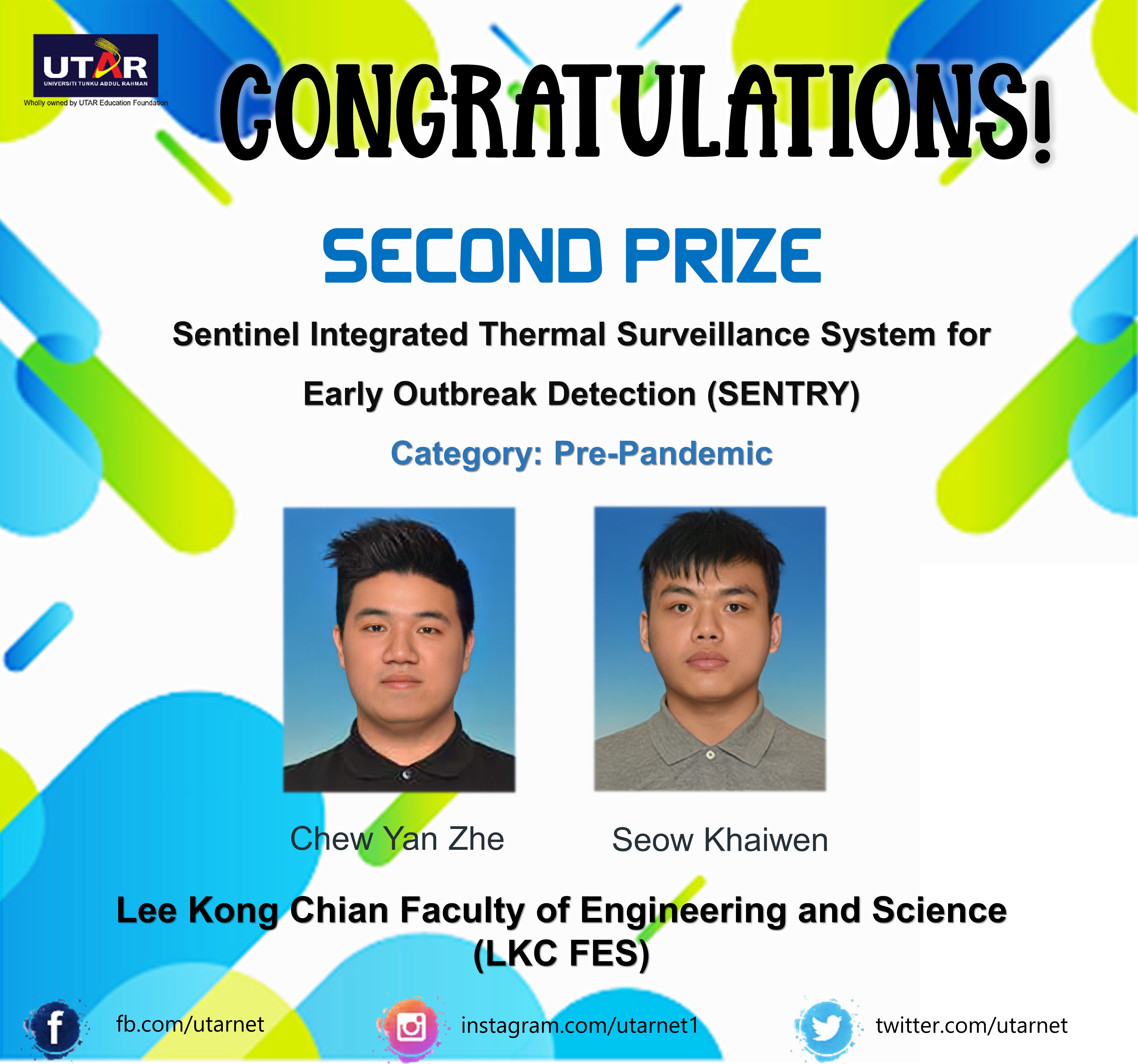
UTAR LKC FES students win second prize in Industry-University Challenge 2020 – Smart City: Pandemic Management
A team of two UTAR Lee Kong Chian Faculty of Engineering and Science (LKC FES) Bachelor of Engineering (Honours) Electrical and Electronic Engineering student Chew Yan Zhe and Bachelor of Science (Honours) Applied Mathematics with Computing student Seow Khaiwen earned second prize in the virtual grand finale of “Industry-University Challenge 2020 - Smart City: Pandemic Management”. Held on 5 December 2020 via ZOOM, the challenge was jointly organised by Intel and CREST.
The duo walked away with a Garmin Forerunner 245 smart-watch each for their winning project, titled “Sentinel Integrated Thermal Surveillance System (SENTRY)”. The team was supervised by LKC FES lecturer Ir Ts Dr Tham Mau Luen.
The Industry-University Challenge 2020 is a national innovation challenge that focuses on innovating Smart City solutions using Internet of Things technology for pandemic management. The challenge was divided into three categories, namely Pre-Pandemic, Pandemic and Post-Pandemic.
When asked about how they both felt about the win, Chew and Seow enthused, “We joined the competition because we would like to take up the challenge to implement what we have learned in a real-life scenario, which is especially relevant to everyone now since we are in midst of the Covid-19 pandemic. Not only that, we would be able to learn about new technologies and techniques as well. Although we were not able to be the champion for the category we joined, which is the pre-pandemic category, we are still very grateful and humbled for the opportunity to present our ideas in the final stage. Throughout the competition, we definitely expanded our horizon and gained new insights on ideas and technological implementations that other participants have shown. We would like to thank the organisers for organising this competition especially when we are in in the midst of a global pandemic. We would also like to thank our project advisor, Dr Tham, for providing guidance and advice to us throughout the entire process.”
They added, “We were motivated by the fact that fever is a common symptom during influenza outbreaks and pandemics, as well as the lack of automation and heavy usage of healthcare resources in existing sentinel surveillance methods. Hence, our objectives are to develop a general sentinel surveillance system by jointly utilising thermal and face detection methods, and to predict outbreak trends by using automatic data collection and artificial intelligence methods. To summarise the implementation of our prototype, we used a thermal sensor and camera to detect faces and corresponding temperatures. Recorded cases of fever in an area will be recorded and analysed using conventional statistical techniques as well as artificial intelligence methods to determine whether a possible disease cluster is formed. These data are then displayed on a dashboard for the ease of understanding.”
The coach of the team, Dr Tham added, “The Industry-University Challenge 2020 is an annual innovation challenge that focuses on innovating Smart City solutions using Internet of Things technology. Since the participating teams come from either Intel or Universities, the challenge provides insights on how well UTAR students can perform with respect to existing engineers in the national platform. I am proud of my team’s achievement as it is not easy to come up with an innovative solution, especially in this Covid-19 situation. They demonstrated excellent technical and presentation skills in the finale. One of the highlights is that students had to deliver a workable live demo in the virtual competition. Marks were given based on technology readiness. The challenge required them to take on challenging tasks that require good communication, collaboration and teamwork. I believe, this achievement will inspire them to do their best not just in future competitions, but also in academics.”
The Industry-University Challenge 2020 was categorised into three rounds, namely Preliminary Round where teams were required to submit a project proposal by the due date; Semi-Final Round where the shortlisted teams were required to submit videos presenting the solutions while the judges access and select two teams from each category for the final round; and Final Round where six finalist teams were required to take part in team presentation on a virtual live platform before a panel of judges for the question and answer session.

© 2020 UNIVERSITI TUNKU ABDUL RAHMAN DU012(A).
Wholly owned by UTAR Education Foundation Co. No. 578227-M LEGAL STATEMENT TERM OF USAGE PRIVACY NOTICE